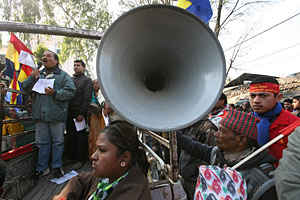 |
Student unions of several political parties have demanded that Nepal Oil Corporation (NOC) reverse the recent fuel price hike. In a joint statement, they warned that they would launch a protest program if NOC did not comply.
The statement points out that instead of making internal improvements to eradicate irregularities, corruption and criminal activities, NOC has increased prices at the expense of consumers. It argues that it is not justifiable for NOC to announce a bonus for its employees and on the other hand, increase prices citing losses for the corporation.
NOC has announced an increase of Rs 3 in petrol, diesel, and kerosene, and a Rs 75 increase on LP gas cylinders. Last year, NOC was forced to reverse its decision to grant bonuses worth almost Rs 200 million to its employees, following profits of Rs 3.39 billion.
Although NOC has taken no initiative to make internal improvements, it blames fuel traders for its loss. However, the management of the corporation has been importing less oil from Raxaul, which is closer and works out cheaper, and more from Barauni. It costs Rs 9.13 extra to transport oil from Barauni and a study by NOC shows that 250 litres of oil per tanker are stolen during the process. But even after employees submitted a file at the Commission of Abuse of Authority, no action has been taken in this regard.
In response to the protests, NOC has released a statement to clarify its decision. It has claimed that because of increase in the international prices of crude oil, the domestic prices had to be increased. The corporation's losses reached a high of Rs 43 million after the international price rose to US$90 per barrel. However, the statement does not mention the cost price that NOC pays in India. In addition, when the international price had dropped to $40 per barrel earlier, NOC still maintained the price it had announced when the rate was $75 per barrel.
The corporation has not invested in improving its technical capability or in quality control mechanisms. When losses occur NOC seeks to transfer costs to the consumers � but it makes no effort to give profits back to consumers when it is in the black.


